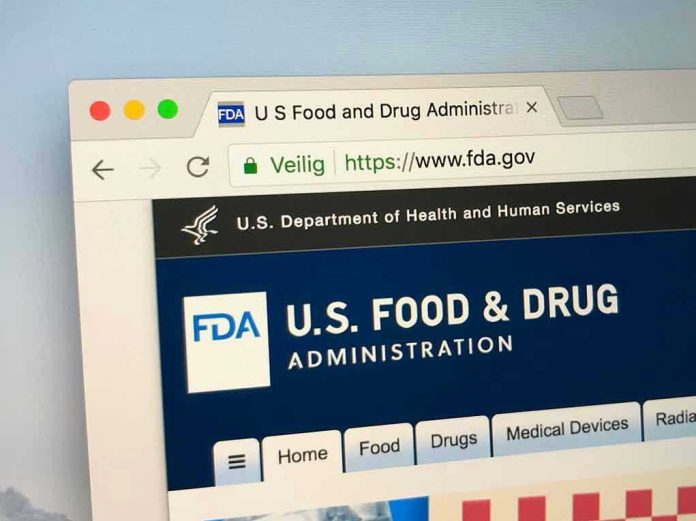
How does a familiar medication turn into a silent threat lurking on pharmacy shelves?
Story Snapshot
- FDA recalls over 500,000 bottles of prazosin hydrochloride due to nitrosamine impurities.
- Nitrosamines, known carcinogens, found above safe limits in blood pressure medication.
- Recall affects capsules with expiration dates between 2025 and 2026.
- Patients advised to consult healthcare providers before discontinuing use.
FDA Recall Sparks Public Health Concerns
The FDA has issued a nationwide recall of prazosin hydrochloride, a commonly prescribed medication for hypertension and PTSD-related nightmares. This action follows the discovery of nitrosamine impurities, known as probable human carcinogens, in the medication. Over 500,000 bottles are affected, highlighting the significant scale of this recall. The recall, classified as Class II, indicates a moderate risk of medically reversible or temporary adverse health consequences. Patients are urged to seek medical guidance before altering their medication regimen.
Nitrosamine contamination is not a new issue in pharmaceutical manufacturing. Since 2018, several recalls of blood pressure medications like valsartan and losartan have occurred due to similar impurities. These compounds can form during chemical manufacturing processes, particularly under certain conditions when solvents or reagents degrade. The FDA has since implemented stricter guidelines and testing protocols to monitor these impurities. The prazosin recall underscores the ongoing challenge of ensuring drug safety in the pharmaceutical industry.
Stakeholders and Their Roles
Key stakeholders in the recall include the FDA, Teva Pharmaceuticals, healthcare providers, and patients. The FDA’s primary role is to protect public health by enforcing safety standards. Teva Pharmaceuticals, the manufacturer, voluntarily initiated the recall to comply with regulatory requirements and to protect its brand reputation. Healthcare providers serve as intermediaries, advising patients on safe alternatives and ensuring continuity of care. Patients, the most affected group, seek reassurance and safe, effective treatment options.
The power dynamics in this situation are clear. The FDA holds regulatory authority, manufacturers are accountable for compliance, and healthcare providers bridge the gap between regulatory actions and patient care. Decision-making involves the FDA’s drug safety divisions, Teva’s quality assurance teams, and medical associations that influence public messaging.
Current Developments and Public Response
As of late October 2025, the recall continues, with over 580,000 bottles of prazosin hydrochloride recalled. The FDA has issued public statements detailing the recall’s scope and associated health risks. Medical experts stress the importance of medical advice before discontinuing the medication, as abrupt cessation can pose immediate health risks. No confirmed cancer cases have been linked to the recalled lots thus far. Distribution channels and pharmacies are actively removing affected lots from shelves, reflecting the seriousness of the recall.
In the short term, the recall disrupts medication supply for patients and increases demand for alternative antihypertensive drugs. This situation may heighten patient anxiety and challenge healthcare providers managing medication transitions. Long-term implications could include increased regulatory scrutiny, changes in manufacturing processes, and potential litigation if harm is demonstrated. The pharmaceutical sector may face broader effects, including heightened vigilance for nitrosamine impurities and further recalls if similar contaminants are detected in other medications.
Expert Perspectives and Future Directions
Industry experts acknowledge the known risks of nitrosamine impurities in pharmaceutical manufacturing, noting that regulatory agencies have become more proactive since the 2018 ARB recalls. The FDA considers the cancer risk from short-term exposure to be low but emphasizes the importance of long-term safety. Academic pharmacologists stress the need for robust quality control and the challenges of detecting trace impurities in complex supply chains. Medical professionals advise against discontinuing blood pressure medication without consulting a healthcare provider.
Opinions vary on the FDA’s response, with some experts viewing it as effective oversight while others call for stricter pre-market testing and transparency. FDA and major news outlets consistently report on the recall’s scope, risks, and recommended actions, reinforcing the importance of credible information in public health matters.









